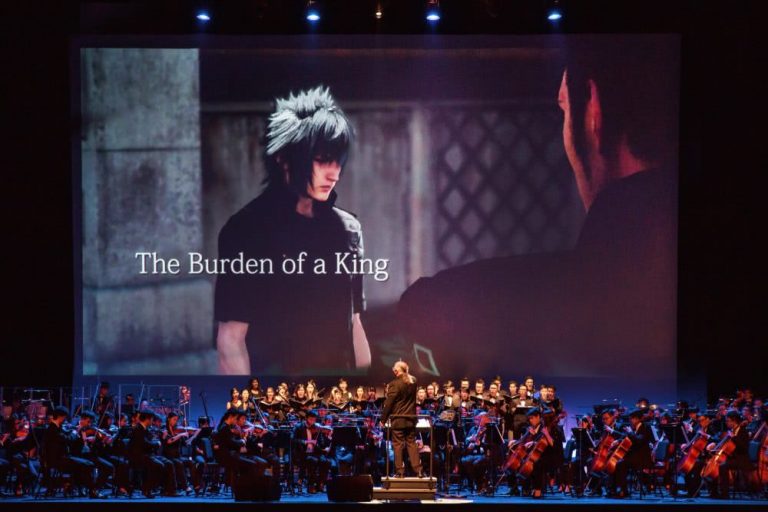2017 is an auspicious year for Square Enix, marking the 30th anniversary of the video game developer’s sci-fi/fantasy saga Final Fantasy in its many iterations. Across its fifteen titles and countless spin-offs, remakes and reboots, it has shipped over 100 million units worldwide and become the quintessential Japanese role-playing game and manga hair simulator. And on the world anniversary tour, Sydney is the first stop.
On the stage of ICC, a huge symphonic orchestra and chorus will be lead through a selection of the game series’ finest musical moments, led by Grammy-winning conductor and composer Arnie Roth. As the musical director of PLAY! A Video Game Symphony since 2006, Roth has been instrumental in bringing game soundtracks to life, and Final Fantasy will be his constant companion until January 2018.
https://vimeo.com/130623465
“We wanna represent as much of the entire series as possible, but we also need to make sure we have some of the beloved classics on there and also new arrangements of things, surprises for the fans,” he says.
“The two big classics that have to be in every Final Fantasy program – we’ll certainly have Final Fantasy X’s ‘Zanarkand’ and Final Fantasy VII’s ‘One Winged Angel’ – there should be no Final Fantasy concert without those two.”
Roth’s attachment to the series, fascinatingly, is predominantly through his collaboration and relationship with series’ composer Nobuo Uematsu, one of the gaming world’s most iconic musicians. Roth sees him as a unique artist in his field, and a man ahead of his time.
“The wonderful part of this is, many video game composers – and this goes for film composers as well – do sketches of the compositions that they’re using as they’re working, and they rely on a whole team of other people to flesh out these sketches into full-fledged compositions, whether it’s just orchestrating or further arranging the material,” says Roth. “Nobuo is actually one of the anomalies, in a way – if you go back and listen to his original soundtracks, so much of the orchestration and the arranging is already done in these things, he was thinking along those lines years before we were performing FF scores live with orchestra and chorus.
As a musician, as a conductor, you can’t really aspire to a better position than working with the world’s greatest orchestra in many of the world’s most fantastic venues.
“The most remarkable thing for me as an arranger, orchestrator, composer and conductor is to go back to his original soundtracks and see what his mind was up to on those soundtracks, many of which were done with 8-bit capabilities so you could only have two or three voices on this computer chip. We go back to these things and we can hear essentially full operas and full orchestra arrangements, done in this summary style that he had to deal with, and to me it’s completely eye opening to look at that and then translate it to full orchestra scores.”
While much of Roth’s work lies in arranging for the stage – and coaxing composers out into the live space – he often finds his work done for him in regard to Uematsu, whose complex melodies and structures are already highly developed.
“It translates so easily because [Uematsu] gave you everything in these little 8-bit sketches. In [1994’s] Final Fantasy VI, he has 40, 45 minutes of opera in this video game where he could not record the human voice! Or any instruments! … No one was doing this stuff back then.
“All this translates to the concert hall stage perfectly. So, for me, as a conductor and a musician, working with Nobuo Uematsu is the best of all worlds because his music comes to the table fully fleshed out.”
In Final Fantasy VI, [Nobuo Uematsu] has 40, 45 minutes of opera in this video game where he could not record the human voice! Or any instruments!
The average modern day composer, by Roth’s estimation, is “more about studio technology and keyboards”, and he acknowledges that their talent for writing does not come bundled with the confidence to conduct a full symphonic orchestra. In that respect, he’s worked alongside brilliant composers such as Hans Zimmer and Ramin Djawadi to get them comfortable bringing their respective compositions to the live space.
And yet, he has never managed to persuade the introverted Uematsu on stage with the whole ensemble. The composer will be there – but not on the stage.
“It’s the funniest thing,” says Roth. “All of his writing reflects a good deep understanding of orchestration, except he really doesn’t like coming up on stage and actually performing them on stage with an orchestra and chorus.
“Unless he’s doing it with his rock band, and then he’s more comfortable,” he laughs. “You would think that’d be an easy thing for him, but it’s not, he’s not comfortable with that, and yet you can question him about almost any classical composer, any rock, any Celtic music any jazz groups or composers. He’s very well versed. The first time I met him, he knew everything about me, knew my complete background.”
The first time I met him, he knew everything about me, knew my complete background.
Roth is quick to assure that there’s no opportunism in the tour’s timing – it’s not intrinsically linked to any new releases from Square Enix, save a remastered version of Final Fantasy XII. (“I don’t think they’re ready to release [the remake of] Final Fantasy VII yet, but believe me when I say I may be the last person to find that out,” he quips.) The anniversary exists to bring the series’ beloved compositions to life, and Roth lives for the opportunity to do so.
“I have grown quite a bit working with Nobuo Uematsu’s music. As a musician, as a conductor, you can’t really aspire to a better position than working with the world’s greatest orchestra in many of the world’s most fantastic venues … I couldn’t hope for anything better.”
Final Fantasy: Distant Worlds comes to life at Sydney’s ICC Theatre on Saturday July 1.



































